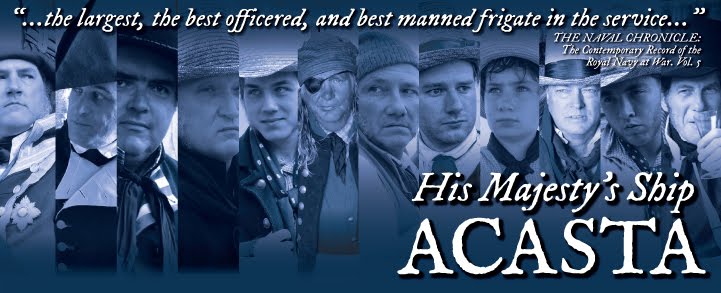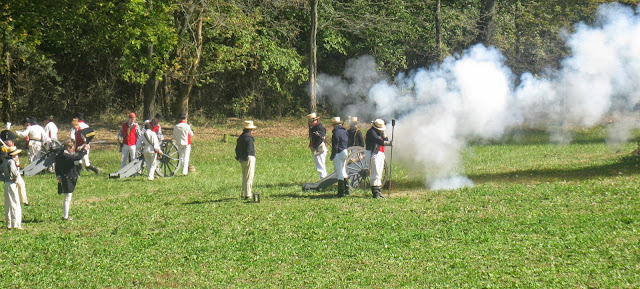From:
Captain Thomas Hurlbut,
Royal Navy Yard, Kingston, Upper Canada.
To:
Captain Robert Freymann,
HMS Acasta,
Halifax Station.
December 1, 1813.
Dear Captain Freymann,
How are you, Sir? Has God graced you and your fine ship and crew with opportunities for distinction and prize money by sending enemy vessels your way? I hope that good things have happened to ease the monotony of blockade duty. Well I remember the tedium of tacking off of enemy ports for weeks or months at a time, watching the seamen go through their routine tasks again and again to the point of contempt for their duty. It was ours to ensure they continued and performed their assignments as well the thousandth time as the first. Little did we know that knowing what to do in a crisis was learned through the endless repetition that was blockade duty.
Since last I wrote, many things have happened here on our inland seas, some good, some bad. As I recall, I was about to travel overland to Amherstburg, on the Detroit River, to endeavour to salvage what was left at the shipyard after the Squadron departed for their meeting with Commodore O.H. Perry. It seems that General Procter and Commodore Barclay agreed that the lines of communication and supply needed to be opened and, as soon as ship-sloop HMS Detroit was ready, the entire force was gathered together and set sail. Barclay’s battle report was received recently and the outcome of that battle was much as Lt. Tumbusch reported, with the entire British squadron captured by Perry.
A north west wind was thought to give Barclay the weather gauge over the US squadron anchored at the Bass Islands. As Detroit was armed with a collection of long guns gathered from Fort Malden, she would have the advantage of range and skillful use of the weather gauge would allow the Commodore Barclay to hit the Americans without being hit himself. So, despite the fact that the British squadron was out manned, outgunned and outnumbered there might be a winning strategy. It was not to be.
Not long after the two fleets sighted each other, the wind shifted and Commodore Perry had the weather gauge. Still, Barclay used the time of approach well, using his long guns to effect. Both squadrons formed line-of-battle with the flagships leading their respective fleets.
It is unclear as to what the Americans’ intentions were but Perry in brig-sloop Lawrence (493 tons, 110’ between perpendiculars, 18-32 pdr carronades and 2-12 pdr guns) led with brig Caledonia (86 tons, 1-32 pdr carronade and 2-12 pdr guns, all on pivots) behind, then Niagara (same as Lawrence) followed by some schooners and sloops, most equipped with single long guns on pivots. It is obvious that the brig sloops are similar in size to the Madison, bigger even than Wolfe, the largest British warship on the lakes.
Barclay led in Detroit (305 tons, 92’ 6” between perpendiculars, 1-24 pdr carronade, 2-24 pdr guns, 1-18 pdr pivot gun, 6-12 pdr guns and 8-9pdr guns) followed by ship-sloop Queen Charlotte (254 tons, 92’ 6” between perpendiculars, 14-24 pdr carronades, 1-24 pdr pivot gun and 2-24 guns). In addition there were also a few small brigs, schooners and sloops, similarly armed to the American schooners. From this data, you can see that the two ship-sloops are actually slightly smaller than Royal George and certainly more lightly armed.
Having lost the weather gauge through no fault of his own, Barclay endeavoured to concentrate his force on the enemy flagship and the Americans accommodated this strategy, the Niagara hanging back, not willing to leave her place in line by passing the slow sailing Caledonia and support the beleaguered American Commodore. After two hours of the entire British squadron firing into Lawrence, Perry removed his flag from the shattered brig to the undamaged Niagara. The Lawrence then struck her colours.
The report from Barclay suggests that it was felt that the Americans would retreat and try again another day. Certainly, the British squadron had suffered at the hands of Lawrence and her terrible battery of 32 pdr carronades, fired at close range. Every command officer was either killed or wounded including Commodore Barclay himself.
Perry must have had some idea as to the real damage received by the British squadron, for he promptly sent the Niagara’s commanding officer off to gather the schooners and bring them to battle, and then set sail directly for the enemy. Detroit, Queen Charlotte and Lawrence were in no condition to continue and as they had fouled each other, could not manoeuvre. In turn, they struck to the fresh Niagara.
Of the remaining vessels, all those who could, attempted to flee but between casualties and battle damage, they were incapable of escape. One report says that the flush-decked HM Schooner Chippewa had no one left standing on her deck.
The disparity in numbers between these squadrons is astounding but again, through co-operation, a markedly inferior British squadron gave a good accounting against a superior foe however, in this case, what good fortune there was favoured the enemy. This time, a bloodied enemy did not retreat, but returned to the fight and prevailed.
Before long on my trip to the dockyard where this sorry tale began, I began to run into dispatch riders hurrying to Burlington with news of developments at Amherstburg. While the outcome must have been known to General Procter on September 11th or 12th, facilities and remaining stores were not burned at Detroit until the 24th, and Malden on the 26th. The retreat began the following morning when Perry’s fleet was reported entering the Detroit River. General Harrison occupied the remains of Fort Malden on the evening of the 27th.
Proctor took his remaining force which included nearly 900 of the 41st Foot and those Indians who could not remain up the Detroit River to Lake Saint Clair. He then pushed up the road along the Thames River into the interior. However the pace was insufficient to outrun the pursuing Americans who have a mounted unit of riflemen and gunboats on the river.
On my now pointless journey to Amhersburg, I had reached the Moravian Town by the 5th October and encountered the retreating Right Division of General Procter. I heard from the many soldiers nearby that a rearguard would be attempted two miles downriver as the Americans had closed to within a short distance of the column. I hurried to see what support I and my party might offer and thought that sailormen might aid with the artillery. The lone 6 pdr was placed on the road on the north bank of the river but we discovered that the artillerymen had no ammunition. Shortly thereafter, the ragged line of dispirited infantrymen between us and the enemy were ridden down by the Kentuckians and they were amongst us. They then dismounted and led their horses through a small swamp in the centre of the battlefield and then attacked the Indians who were anchoring the right flank of the British line in another swamp to the north. By now the surviving redcoats were retreating along the road, including the General himself. We could see that there was little we could accomplish and so went with them.
The Indians stayed for a while longer. We could hear the sounds of battle behind us for at least another hour but, after that, either distance or death silenced them. It is reported that Tecumseh has fallen.
Only 246 officers and men of the Division escaped and made their way to Burlington Heights and the relative security of the fortifications there and the men of General Vincent’s Centre Division. I continued back to Kingston.
It is well that the Americans did not pursue us further but they must have known we would be no threat to the consolidation of the Detroit frontier under the American colours for the remainder of this year. We at first considered that they had no wish to extend their supply lines into the wilderness with winter coming on but the real reason eluded us for a while. The truth of that might shock you.
I shall expand on that in my next post but again I am summoned to Sir James, this time to consult on possible alternate routes to the upper lakes and to perhaps construct a shipyard on a hidden bay on Lake Huron. The war on that front is rapidly getting out of hand, and the war here on the lower lake is by no means a sure thing.
I remain,
Your Most Humble and Obedient Servant,
Captain Thomas Hurlbut,
Royal Navy Dockyard,
Kingston, Upper Canada.
 Signal Flags - These posts involve images and information having to do with this means of communication during the War of 1812. Sometimes they even involve fun messages to be decoded!
Signal Flags - These posts involve images and information having to do with this means of communication during the War of 1812. Sometimes they even involve fun messages to be decoded!
































